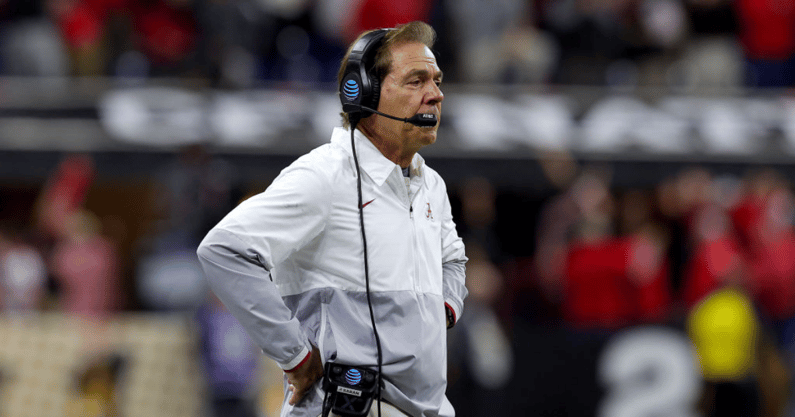Nick Saban believes current state of NCAA football is not ‘sustainable’

With the changing transfer portal rules and a developing NIL landscape, college football finds itself in a new era which has kicked off what many call “free agency.” Alabama head coach Nick Saban, who has been one of the most willing to adapt throughout the years, weighed in on the future of the sport.
During a recent interview with the Associated Press, Nick Saban criticized college football and called for leaders to make swift changes.
“I don’t think what we’re doing right now is a sustainable model,” Saban said. “The concept of name, image and likeness was for players to be able to use their name, image and likeness to create opportunities for themselves. That’s what it was. So last year on our team, our guys probably made as much or more than anybody in the country.
“But that creates a situation where you can basically buy players. You can do it in recruiting. I mean, if that’s what we want college football to be, I don’t know. And you can also get players to get in the transfer portal to see if they can get more someplace else than they can get at your place.”
The sentiment of Nick Saban has been echoed by Ole Miss head coach and former Alabama assistant Lane Kiffin, who compared the state of college football to the NFL. His former boss now repeats the comparison.
“We now have an NFL model with no contracts, but everybody has free agency,” said Saban. “It’s fine for players to get money. I’m all for that. I’m not against that. But there also has to be some responsibility on both ends, which you could call a contract. So that you have an opportunity to develop people in a way that’s going to help them be successful.”
Nick Saban on college football
In response to the changing NIL legislation across the country on a state level, many schools have established “collectives,” which help players find NIL opportunities and create a more uniform value across the roster.
Top 10
- 1New
FSU Shooter
Police identify shooter
- 2Hot
Carson Beck
Talks trash to Miami OC
- 3
Tampering accusation
Deion Sanders calls out UVA
- 4Trending
Chad Baker-Mazara
Auburn star entering portal
- 5
Deion Sanders jab
CU coach blasts NCAA
Get the On3 Top 10 to your inbox every morning
By clicking "Subscribe to Newsletter", I agree to On3's Privacy Notice, Terms, and use of my personal information described therein.
However, these collectives also provide boosters the opportunity to channel payments that used to be an NCAA violation into a new channel that could still impact players’ decisions.
“So there’s going to have to be some changes implemented, some kind of way to still create a level playing field,” Saban said. “And there is no salary cap. So whatever school decides they want to pay the most, they have the best chance to have the best team. And that’s never been college football, either.
“We give everybody the same medical care, academic support, food service. Same scholarship. So if we’re going to do this, then everybody is going to benefit equally. I’m not going to create a caste system on our team.”
Despite all his heavy criticism, Saban was also sure to make clear his intention to adapt like he has to every twist and turn over the past 30 years of college football.
“I know we have to adapt to that,” Saban said. “You’re going to have kids out there that say, ‘Well, I can get a better deal going someplace else,’ and they’ll go there. But you’re also going to have people that see the light and say, ‘Yeah, they’ve got a good history of developing players. They got a good history of developing people, they got a great graduation rate and that value is more important.’
“And they’re distributing money to everybody in the organization.”